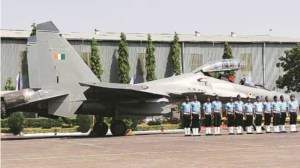Air-India, IOC set for Cabinet decision on privatisation
NEW DELHI, APRIL 21: Moves to shed a huge stake in Air-India will be high on the agenda when India's cabinet decision makers meet on Satur...

NEW DELHI, APRIL 21: Moves to shed a huge stake in Air-India will be high on the agenda when India’s cabinet decision makers meet on Saturday to decide on disinvestment issues, officials said on Friday.
Last week, Civil Aviation ministry officials said the next meeting of the cabinet panel would take a decision on the stake to be sold in Air-India. A ministerial committee has been working out detailed recommendations.
Last year, the Disinvestment Commission, which advises the government on sale of stakes in state companies, had suggested that the government sell 40 per cent of Air-India’s equity to a strategic investor and 20 per cent to domestic institutional investors, employees and the public.
In January, the ground was set for the privatisation of Air-India to take off, when the cabinet had decided to sell off 51 per cent of the equity of state-run Indian Airlines, the country’s domestic carrier.
Indian Airlines is currently in the process of shortlisting a global adviser for the privatisation.
Indian Airlines has a fleet of 56 aircraft, while Air-India has 26.
With its fleet ageing, Air-India urgently needs resources to modernise its fleet but faces a host of problems.
It has more than 18,000 employees, and, at 750 employees per aircraft, has one of the highest employees per aircraft ratios in the world.
The best airlines in the world are said to deploy 200 to 300 employees per aircraft.
The airline urgently needs to replace four Boeing 747-200 aircraft which are almost 20 years old, and also needs to soon replace three Airbus 300 aircraft.
Air India, which lost Rs 174 crore ($39.95 million) in 1998/99 (April-March), had an estimated loss of Rs 897 million in 1999/2000.
Besides Air-India and Indian Oil Corp, the other three firms which are scheduled to be considered for disinvestment on Saturday are mining firms Kudremukh Iron Ore and Company Ltd and National Mineral Development Corporation, and helicopter service company Pawan Hans, officials said.
Meanwhile, a heated debate is on in the Indian aviation industry on the quantum of equity of the Air India (AI) to be given to a foreign strategic partner with one group wanting the stakes to be limited to 25 per cent and the other seeking at least 40 per cent, saying anything less would not be attractive for any investor.
While the FICCI has recommended that the foreign partner "should not hold more than 25 per cent," another section of the aviation industry quoting an international survey said that major chunk of world airlines have given over 40 per cent stakes to their foreign airline shareholders.
However, FICCI, in its comments on the Draft Civil Aviation policy, has recommended that besides 25 per cent stake to foreign partner, another 26 per cent should be offered to Indians and NRIs and the management control of the airline should remain in the hands of Indian partners.
However, sources in the aviation industry said that no world-class foreign airline, which is a stable corporate entity and is profitable, with 25 per cent stake would be interested "only in harvesting and feeding its own carrier" instead of investing in AI’s fleet, infrastructure and facilities.
They said a strategic partner, with less than 40 per cent stake, would be vulnerable to hostile take-overs especially when AI is back on rails and starts earning profits.
The foreign partner would also like to have management control as it would like to be party in major decisions which would determine AI’s future investment and direction of business, they said.
It is impossible to find a partner who would invest one billion dollar for a 25 per cent stake and still not gain effective management control of the airline, they said.
These sources also said that given AI’s present financial status, investing in the carrier would be "high risk" and hence the strategic partner’s shareholding should give high returns.
Since the Finance Ministry has already declared that government had no money to spare for the much-required deposition of funds for AI, funds for its aircraft acquisition programme would have to be raised by disinvestment, they said.
This showed the necessity of giving away at least 40 per cent shares to a foreign strategic partner instead of a mere 25 per cent, they added. The debate on the quantum of stakes is also going onbetween the ministries of civil aviation and disinvestment.
While Civil Aviation Ministry favours grant of 25 per cent shares of AI to a foreign strategic partner, the Disinvestment Ministry argues that this would neutralise the
Meanwhile, Civil Aviation Secretary Ravindra Gupta last night announced that the global advisor for suggesting ways and means to divest the stakes of Air India has been identified.
Gupta, while addressing a FICCI session on the national aviation scenario, said steps would be taken to arrange code-sharing between Indian Airlines and AI and full utilisation of rights by both airlines for them to make money.





- 01
- 02
- 03
- 04
- 05

























